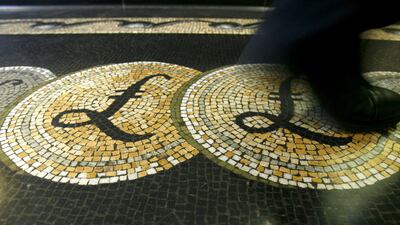Sterling edged lower in early trading on Thursday, approaching a two-week nadir, as investors awaited the end of the Bank of England’s bond-buying programme.
The pound was down by 0.1 per cent to $1.10860 just after 8am UK-time, wiping out most of a rebound in the previous session after reports that the Bank had signalled privately to lenders that it was prepared to extend its emergency programme beyond Friday's deadline, if market conditions demanded it.
However, the central bank later reiterated that its programme of temporary gilt purchases will definitely end on Friday.
The pound later gained some ground against the dollar, rising to $1.1151 by 10.40am.
The government borrows money over long periods of time by selling gilts. The yield they offer — the amount of money an investor receives for owning the debt — is normally lower than other assets because they are supposed to be more reliable.
Longer-duration British gilt yields fell on Thursday, easing back from 20-year highs struck on Wednesday, before the Bank of England bought £4.4 billion ($4.86bn) of debt at its daily reverse auctions.
Thirty-year gilt yields dropped 13 basis points on the day to 4.76 per cent at just after 8am on Thursday, after hitting a high of 5.1 per cent on Wednesday, according to Refinitiv data.
Twenty-year gilt yields were 5 basis points down from Wednesday's close at 4.85 per cent, after a peak of 5.195 per cent earlier that day.
However, real yields for index-linked bonds, which were added to the BoE's purchases on Tuesday after prices plunged on Monday, were mostly up slightly.
The Bank of England is due to hold its penultimate set of daily reverse auctions to buy long-dated conventional gilts and index-linked government bonds on Thursday, before the programme's scheduled end on Friday.
Britain’s embattled prime minister, Liz Truss, confirmed on Wednesday the country would not reverse its vast tax cuts or reduce public spending — a plan which has wreaked havoc in the country's financial markets.
On Thursday, the Bank of England said UK pension schemes are racing to raise hundreds of billions of pounds to shore up derivatives positions before the BoE's Friday deadline.
“We can expect potential market take-up to continue to increase as market participants prepare for the BoE to exit the market. While the government shows little sign of turning back from the path of unfunded tax cuts, we can expect the market to focus on the risks of extended Gilt market volatility and potential contagion risks,” said Jeremy Stretch, head of G10 FX Strategy at CIBC Capital Markets.
He added that unless there is a “position adjustment from the government”, sterling will probably remain under pressure.
Ms Truss is being urged to change tack on an economic package that has roiled markets, with some investors and some of her own MPs calling on her to reverse a plan for £43bn of unfunded tax cuts, including scrapping an increase in corporation tax from 19 per cent to 25 per cent.
She attempted to deflect the sense of growing doom palpable during Prime Minister’s Questions on Wednesday as she insisted she would not cut spending to pay for the tax cuts and energy price guarantee.
Ms Truss later endured a difficult encounter with Tory backbenchers, as she told the 1922 Committee that small businesses would have faced “devastation” if the government had not acted to cap energy prices, according to aides.
She was met with open criticism, according to reports, with MPs reportedly raising concerns about rising mortgage rates and the Tories' slump in the polls.
Damian Green, a former deputy prime minister, said Conservative MPs were openly discussing reversing some of the mini-budget measures as they question how else she can reduce debt after she rejected public spending reductions.
“It is, indeed, a topic of conversation around the tea rooms of the House of Commons as well, because we can all do the rough maths and see that it is very difficult,” he told BBC Radio 4's PM programme.
“One of the obvious ways would be possibly to defer some of the tax cuts or the failure to put taxes up.”


